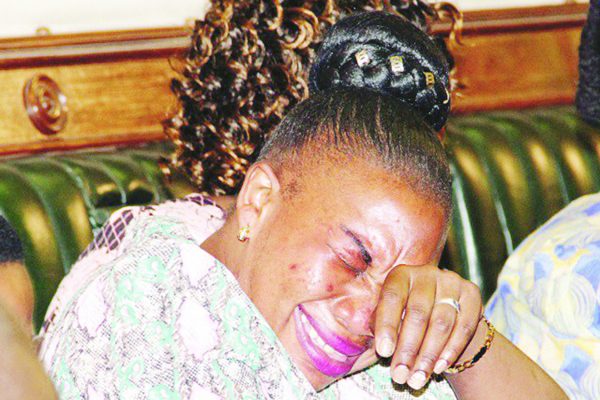
Susan Matsunga, the MDC-T proportional representation (PR) legislator (Harare Metropolitan) might have had her own share of bad publicity on October 26 2016 during the infamous fracas at the Parliament of Zimbabwe, where members of the police stormed into the National Assembly and fought with oppositions MPs, but she now claims that a lot of good has come out of that unfortunate incident.
BY VENERANDA LANGA
Matsunga, who turns 39 this year, opened up to The Standard and narrated how she was affected by the incident as a public figure. She is now assisting several women that are gender-based violence (GBV) victims through counselling to pick up the pieces and move on. “What transpired in Parliament on that day in 2016 really hurt me because at that same time I had problems at home with my now ex-husband and was a victim of gender-based violence,” Matsunga narrated.
“I was married to someone who was abusive and had a negative mind-set about women in politics. He thought women in politics are of loose morals, and so when the fracas happened in Parliament he blamed me for being a victim. The police stormed Parliament to eject Budiriro MP Costa Machingauta resulting in a fracas with opposition MPs. During the milieu one of the police officers grabbed my breasts as they battled with MPs,” she said.
She continued: “It hurt me so much, and at that time most people did not understand why I broke down. The reasons were that at home I was a victim of abuse, and then at Parliament I was also abused, and so even if I am a public figure I had to stand for my rights and I raised a point of order with the deputy Speaker of the National Assembly Mabel Chinomona pointing out that I felt mistreated by the policeman in question.”
She said after the Parliament incident she arrived home and unfortunately her ex-husband ridiculed her, saying she had failed to avoid the embarrassment by moving away from the scuffle.
“The police officer had no right to grab my breasts. I have since forgiven his mischief, but that was after I opened a docket with the police. The policeman in question has since apologised and I accepted the apology. I even got counselling and an apology from Chinomona who also called me and other affected women to talk about the incident.”
Matsunga said the bad media publicity that she then got affected her because some reports were falsely written with some alleging her underwear was torn in the fracas.
- Chamisa under fire over US$120K donation
- Mavhunga puts DeMbare into Chibuku quarterfinals
- Pension funds bet on Cabora Bassa oilfields
- Councils defy govt fire tender directive
Keep Reading
“When I read some newspapers they were even saying that my underwear was torn, but it was Lwazi Sibanda (another MDC-T PR legislator) who lodged a complaint with Chinomona, saying her underwear had been torn during the pushing and shoving between the police and opposition MPs.” Matsunga said workshops on gender relations with the media by the Gender Media Connect were useful, and she began to understand how the media operates. She has learnt to ignore the bad publicity.
“As an MP without a specific constituency, I am now using my experience as a GBV victim to counsel different women that are victims. I want them to be positive about life and to understand that they cannot die or give up life for any man. In Parliament I advocate against GBV and early marriages. Some of the women I have had counselling sessions with even contemplated committing suicide and I used my personal experiences to help them look at life positively.
“In Parliament I have also supported motions on ensuring that girls have access to sanitary wear because we cannot have condoms being dished out for free when sanitary wear is very expensive. In fact, non-governmental organisations must be urged to donate more sanitary wear than condoms because lack of sanitary wear can cause serious reproductive problems,” Matsunga said.
In Parliament, Matsunga is one of the fiercest when it comes to interjections. She said as an MP there is need to be aggressive, especially when advocating for issues such as free sanitary wear.
Although she came in through the PR quota, which brought in 60 females uncontested into Parliament, Matsunga said chances were high that this year she would campaign and be one of the female MPs with constituencies.
“I feel that I have grown politically through grooming from other MPs like Paurina Mpariwa (Mufakose MP). She has been of great help and has helped me to mature politically. I feel that if I get to represent a constituency, I will be able to debate issues in Parliament which directly affect the people,” she said.
Recounting how she entered into politics, Matsunga said she grew up in a family which supported Abel Muzorewa (former Zimbabwe-Rhodesia prime minister 1979), adding that during that time she witnessed a lot of violence meted onto her family.
“I was very young, but I witnessed my family being persecuted for being dzakutsaku, the derogatory name given to Muzorewa’s supporters. My parents were beaten up by Zanu PF supporters and our property was damaged and thrown out. I watched in pain and I decided that I would become a politician and fight every form of abuse and violence.”
She said she then joined the opposition MDC when it was formed in 1999, and also witnessed a lot of violence and brutality directed at opposition supporters. She attained a position as secretary of the youth wing in Mufakose, and in 2015 she joined Parliament as PR MP after the MDC-T recalled legislators who had crossed over to Tendai Biti’s faction.











